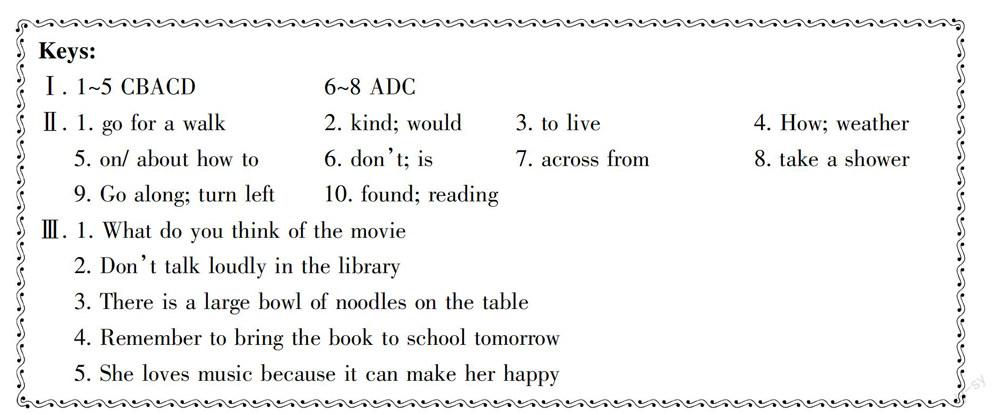新目标英语七年级 (下)重点句型展示
屈培华

1. find sb. doing...
该句意为:“发现某人正在做某事”。常见的类似的动词还有see, hear, watch, keep等。如:
I found my brother reading in his room. 我发现哥哥在他房间里看书。
I saw her dancing under the tree. 我看见她在树下跳舞。
2. That made me feel very happy.
(1)make sb. do sth.意为“使某人做某事”,句中的make是使役动词,其后接省略to的动词不定式。如:
The boss made them work for ten hours a day. 老板让他们一天工作十小时。
(2)feel是感官动词,可作连系动词,不能单独作谓语,需与表语一起构成谓语。如:
He feels very happy when he stays with his parents. 当他与父母在一起时,感到非常幸福。
3. We had fun doing...
该句意为:“我们做某事很愉快”。fun是不可数名词,前面不能用不定冠词修饰,但可以 用great, much,a lot of等加强语气。如:
We have fun swimming in the sea. 我们在海里游泳很开心。
We had a lot of fun climbing mountains. 我们爬山真痛快。
【拓展】have fun的同义词组还有enjoy oneself和have a good time。如:
We had fun at the party yesterday. = We enjoyed ourselves at the party yesterday. = We had a good time at the party yesterday. 昨天我们在聚会上玩得很开心。
4. And he doesnt wear glasses any more.
“not...any more”意为“不再……”,相当于no more,指程度上或做事的次数不再增加。如:
I cant drink wine any more. 我不能再喝酒了。
I didnt hear from her any more. 我再也没收到她的信。
【比较】“not...any longer”意为“不再……”,相当于no longer,指时间不再延长,多与延续性动词连用。如:
He doesnt live here any longer. 他不在这儿住了。
5. Some are... Others are...
该句意为:“一些……另一些……”。others是other的复数形式,泛指其他人或物,表示不确定的复数含义。如:
Some are singing. Others are dancing. 一些人在唱歌,其他人在跳舞。
6. sb. want to be...
该句意为:“某人想成为……”。用来表示某个人的理想。want是及物动词,表示“想要;希望”时,其后可接名词、代词、不定式(to do结构)作宾语。如:
She wants to be a policewoman. 她想当警察。
7. I hope you have a good trip.
(1)这是一个含有宾语从句的复合句,“You have a good trip”是宾语从句,省略了连词that,其宾语从句的谓语用现在时表示将来的意义。如:
I hope you like my present. 我希望你喜欢我的礼物。
(2)hope用作及物动词时,其宾语通常只能是不定式或that从句。如:
I hope to visit Paris some day. 我希望有一天能去巴黎。
I hope that he will come back soon. 我希望他能早点回来。
8. Next to the hotel is a small house with an interesting garden.
(1)这是一个倒装句,正常语序是:A small house with an interesting garden is next to the hotel.
(2)句中的with是介词,意为“具有……;带有……”,在句中作定语修饰a small house。如:
The girl with long hair is my sister. 那个长头发的女孩是我的妹妹。
9. I showed each student six things and asked them about each other.
(1)show sb. sth. = show sth. to sb.意为“给……看;出示;展示”。如:
Let me show you my picture. 让我展示我的画给你看。
Please show your new bike to me. 请让我看看你的新自行车。
(2)ask sb. about sth.意为“询问某人某事”。如:
He asked me about my study. 他询问我的学习情况。
10. What do you think of...?
该句意为:“你认为……怎么样?”是用于询问某人对某事物的看法的固定句式。回答时应该说出自己的意见或看法等。如:
—What do you think of Chinese food? 你认为中国食物怎么样?
—Its delicious. 非常美味。
11. What + do/ does + sb. + look like?
该句意为:“某人长什么样子?”是用来询问某人的长相、外貌。look like意为“看起来像”,like是介词。如:
What does your sister look like? 你姐姐长什么样子?
12. What does sb. do?
该句意为:“某人是干什么工作的?”是用来询问职业的。如:
—What does your mother do? 你妈妈是干什么工作的?
—She is a teacher. 她是一名老师。
【拓展】询问职业,还可以用“What + be + sb.?”。如:
What is your brother? 你哥哥是干什么工作的?
13. Why do you like...?
该句意为:“你为什么喜欢……?”这是由why引导的询问原因的特殊疑问句。这类句型的基本结构为:“Why +一般疑问句?”,常用Because引导的原因状语从句来回答。如:
—Why do you like monkeys? 你为什么喜欢猴子?
—Because they are very funny. 因为它们很有趣。
【训练基地】
Ⅰ. 单项选择。
( )1. —Thanks for ______ me about your school life.
—Youre welcome.
A. tell B. to tell C. telling D. tells
( )2. —Where is Nancy?
—She is in the garden. She is having ______ good time there.
A. the B. a C. / D. an
( )3. The children are in the room. ______ are dancing; ______ are singing.
A. Some; others B. Any; others
C. Some; the other D. Some; other
( )4. —Do you like dumplings?
—Yes, I do. But I dont like hamburgers ______ French fries.
A. and B. but C. or D. so
( )5. —John, its 11:00 p.m. Its time ______ to bed now.
—OK, good night, Dad!
A. goes B. go C. going D. to go
( )6. —Mike can speak French. What ______ Jim?
—He can speak it, too.
A. about B. from C. with D. for
( )7. —Did your mother have fun ______ at home?
—Yes, she did.
A. cook B. to cook C. cooks D. cooking
( )8. —Is the girl helping her father ______ the car?
—No. Shes reading a book.
A. washing B. washes C. wash D. washed
Ⅱ. 根据汉语意思完成句子,每空一词。
1. 晚饭后他们经常去散步。
They often ______ ______ ______ ______ after dinner.
2. 你想要吃哪种面条?
What ______ of noodles ______ you like to eat?
3. 他没有找到宾馆住。
He didnt find a hotel ______ ______ in.
4. 上海的天气怎样?
______ is the ______ in Shanghai?
5. 你能给我一些关于学好英语的建议吗?
Could you give me some advice ______ ______ ______ learn English well?
6. 我认为他不是个好学生。
I ______ think he ______ a good student.
7. 超市对面有一个邮局。
There is a post office ______ ______ the supermarket.
8. 彼得晚上洗澡吗?
Does Peter ______ ______ ______ in the evening?
9. 沿着这条街一直往前走,然后向左拐。
______ ______ this street and ______ ______.
10. 我发现他在教室里读书。
I ______ him ______ in the classroom.
Ⅲ. 将下列句子翻译成英语。
1. 你认为这部电影怎么样?
________________________________________?
2. 在图书馆不准大声讲话。
________________________________________.
3. 桌子上有一大碗面。
________________________________________.
4. 记住明天把这本书带到学校。
________________________________________.
5. 她喜欢音乐,因为它能使她快乐。
________________________________________.
Keys:
Ⅰ. 1~5 CBACD 6~8 ADC
Ⅱ. 1. go for a walk 2. kind; would 3. to live 4. How; weather
5. on/ about how to 6. dont; is 7. across from 8. take a shower
9. Go along; turn left 10. found; reading
Ⅲ. 1. What do you think of the movie
2. Dont talk loudly in the library
3. There is a large bowl of noodles on the table
4. Remember to bring the book to school tomorrow
5. She loves music because it can make her happy

